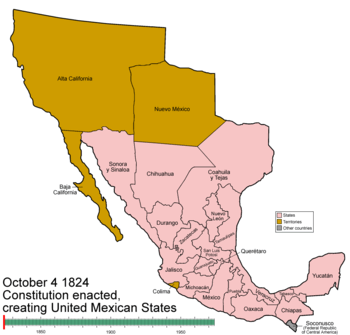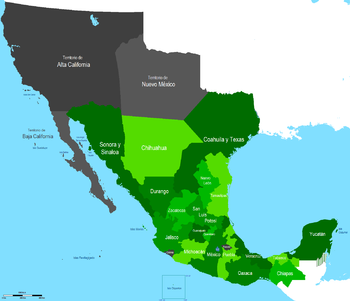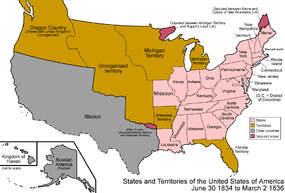- Reconquista (Mexico)
-
For other senses of this word, see Reconquista (disambiguation).
The term Reconquista (in English, "reconquest") was popularized by contemporary Mexican writers Carlos Fuentes and Elena Poniatowska to describe the increased demographic and cultural presence of Mexicans in the Southwestern United States.[1][2][3][4]
Contents
Historical usage
It was originally a jocular analogy to the Spanish Reconquista of Moorish Iberia, since the areas of greatest Mexican immigration and cultural diffusion are conterminous with northern New Spain and former Mexican territories.[5]
Map of Mexico under the Constitution of 1824.
The concept, but not the term "reconquista" itself, has been advanced by Chicano nationalists of the 1970s to describe plans for the creation of a mythical Aztec homeland called Aztlán, Aztlán having been the northern origin of the Azteca people who migrated south into Mexico and founded Tenochtitlan. The map used to illustrate the made up "Aztlan" has nothing at all to do with the "Aztec" (or "Mexica") tribe, which lived far south in what is now central Mexico, but it is rather, a map of land explored by the Spanish, and claimed by the Spanish, for Spain (New Spain) after their arrival from Europe, land which covers the homelands of a multitude of native tribes, which were many where related through the wide Uto-Aztecan family of languages. Many Chicanos point to this fact as a concrete connection between the southwestern section of the United States and the rest of Mesoamerica. The word properly applies to immigration inside territories won from Mexico in the Texas Revolution and the Mexican-American War.[6]
Modern usage and supporters
Other groups, like the National Will Organization, do not support the concept of the imagined "Aztlan", and identify themselves with the modern Hispanic Mexico, which they see as deprived of its northern territories after the Mexican War.[7] Other groups that support the concept of Reconquista include the Mexica Movement and Voz de Aztlan.
Charles Truxillo
A prominent advocate of Reconquista is Professor Charles Truxillo of the University of New Mexico (UNM), who envisions a sovereign Hispanic nation called the Republica del Norte (Republic of the North) that would encompass Northern Mexico, Baja California, California, Arizona, New Mexico and Texas.[3]Truxillo, who teaches at UNM's Chicano Studies Program on a yearly contract, states in an interview that "Native-born American Hispanics feel like strangers in their own land. We remain subordinated. We have a negative image of our own culture, created by the media. Self-loathing is a terrible form of oppression. The long history of oppression and subordination has to end” and that "Along both sides of the U.S.-Mexico border “there is a growing fusion, a reviving of connections...Southwest Chicanos and Norteño Mexicanos are becoming one people again.”" Truxillo stated that Hispanics who have achieved positions of power or otherwise are “enjoying the benefits of assimilation” are most likely to oppose a new nation, explaining that “There will be the negative reaction, the tortured response of someone who thinks, 'Give me a break. I just want to go to Wal-Mart.' But the idea will seep into their consciousness, and cause an internal crisis, a pain of conscience, an internal dialogue as they ask themselves: 'Who am I in this system?”' Truxillo believes that the Republica del Norte will be brought into existence by "any means necessary" but that it was unlikely to be formed by civil war but rather by the electoral pressure of the future majority Hispanic population in the region. Truxillo added that he believes it's his job to help develop a “cadre of intellectuals” to think about how this new state can become a reality.[8][9][10][11][12]
In 2007, the UNM reportedly decided to stop renewing Truxillo's yearly contract. Truxillo claimed that his "firing" was due to his radical beliefs, arguing that "Few are in favor of a Chicano professor advocating a Chicano nation state."[13]
Jose Angel Gutierrez
In an interview with In Search of Aztlán on August 8, 1999, Jose Angel Gutierrez, a political science professor at the University of Texas at Arlington, stated that:"We’re the only ethnic group in America that has been dismembered. We didn't migrate here or immigrate here voluntarily. The United States came to us in succeeding waves of invasions. We are a captive people, in a sense, a hostage people. It is our political destiny and our right to self-determination to want to have our homeland [back]. Whether they like it or not is immaterial. If they call us radicals or subversives or separatists, that’s their problem. This is our home, and this is our homeland, and we are entitled to it. We are the host. Everyone else is a guest."[14]
He further stated that:
"It is not our fault that whites don’t make babies, and blacks are not growing in sufficient numbers, and there’s no other groups with such a goal to put their homeland back together again. We do. Those numbers will make it possible. I believe that in the next few years, we will see an irredentists movement, beyond assimilation, beyond integration, beyond separatism, to putting Mexico back together as one. That's irridentism. One Mexico, one nation."[14]
In an interview with the Star-Telegram in October 2000, Gutierrez stated that many recent Mexican immigrants "want to recreate all of Mexico and join all of Mexico into one...even if it's just demographically... They are going to have political sovereignty over the Southwest and many parts of the Midwest." [15]
In a videotape made by the Immigration Watchdog Web site (as cited in the Washington Post), Gutierrez is quoted as saying:
"We are millions. We just have to survive. We have an aging white America. They are not making babies. They are dying. It's a matter of time. The explosion is in our population."[3]
In an subsequent interview with the Washington Post in 2006, Gutierrez said there was "no viable" reconquista movement, and blamed interest in the issue on closed-border groups and "right-wing blogs"[3]
Other Views
Felipe Gonzáles, a professor at the University of New Mexico (UNM), who is director of UNM's Southwest Hispanic Research Institute, has stated that while there is a “certain homeland undercurrent” among New Mexico Hispanics, the "educated elites are going to have to pick up on this idea [of a new nation] and run with it and use it as a point of confrontation if it is to succeed.” Juan José Peña, who heads the Hispano Round Table (a Hispanic advocacy group in New Mexico) believes that Mexican Americans currently lack the political consciousness to form a separate nation, stating that “Right now, there's no movement capable of undertaking it.”[9]Illegal immigration into the southwest states is sometimes viewed as a form of reconquista, in light of the fact that Texas statehood was preceded by an influx of U.S. settlers into that Mexican province until United States citizens outnumbered Mexicans 10-1 and were able to take over governance of the area. The theory is that the reverse will happen as Mexicans eventually become so numerous in that region that they can wield substantial influence, including political power.[16] Even if not intended, some analysts say the significant demographic shift in the American Southwest may result in "a de facto reconquista."[3] A 2002 Zogby poll reported that 58% of Mexicans believe that the southwestern US belongs to Mexico.[17]
Harvard University professor Samuel P. Huntington stated in 2004 that:
Demographically, socially and culturally, the reconquista of the Southwest United States by Mexico is well under way. No other immigrant group in U.S. history has asserted or could assert a historical claim to U.S. territory. Mexicans and Mexican-Americans can and do make that claim."[3][4]
Neo-liberal political writer Mickey Kaus has remarked,
If you talk to people in Mexico... if you get them drunk in a bar, they’ll say we’re taking it back, sorry. That’s not an uncommon sentiment in Mexico, so why can’t we take it seriously here? This is like a Quebec problem if France was next door to Canada.[18]Other Hispanic rights leaders insist that Reconquista is nothing more than a fringe element. Nativo Lopez, president of the Mexican American Political Association in Los Angeles, when asked about the concept of Reconquista by a reporter, angerly responded "I can't believe you're bothering me with questions about this. You're not serious. I can't believe you're bothering with such a minuscule, fringe element that has no resonance with this populous."[3]
Reconquista sentiments are often jocularly referred to by media targeted to Mexicans, including a recent Absolut Vodka ad that generated significant controversy in the United States for its printing of a map of pre-Mexican-American war Mexico.[19]
Statistics
According to the United States Census Bureau, as of 2009 and 2010, six out of seven U.S. states with highest densities of people of Hispanic origin were in the Southwestern United States, including the 7 modern-day states that used to be part of Mexico - California (38%), Arizona (30%), New Mexico (46%), Texas (38%), Nevada (27%), Colorado (21%), and Utah (13%) (substantial Hispanic populations also exist in the parts of Oklahoma, Kansas, and Wyoming that were once part of Mexico). 31% of Hispanic residents of the six states (CA, AZ, NM, TX, NV, CO) were born in Mexico, the majority of the remaining 69% being second- and higher-generation Americans of Hispanic ancestry. The four southwestern border states had only 23% of population of the country, but were home to 65% of all first-generation Mexican immigrants.
See also
- Manifest Destiny
- Revanchism
- Irredentism
- Nativism
- Chicano nationalism
- Mexican Cession of 1848
- Movimiento Estudiantil Chicano de Aztlán
- Plan Espiritual de Aztlán
- Mexica Movement
- Voz de Aztlan
- National Will Organization
References
- ^ http://www.nuevodigital.com/2006/04/18/la-otra-reconquista-las-protestas-migrat
- ^ http://www.terra.com/arte/articulo/html/art5133.htm
- ^ a b c d e f g Mexican aliens seek to retake 'stolen' land, Washington Post, April 16, 2006.
- ^ a b The Hispanic Challenge by Samuel P. Huntington, Foreign Policy March/April 2004.
- ^ http://www.prb.org/Articles/2002/MexicanImmigrationtotheUnitedStates.aspx
- ^ Fuentes, Carlos. La frontera de cristal, 1995
- ^ National Will Organization of Mexico
- ^ Frank Zoretich, 'New Mexico Will Secede to New Nation, Prof Says,' Albuquerque Tribune, 31 Jan. 2000, p. A1.
- ^ a b Professor Predicts 'Hispanic Homeland' by the Associated Press (reprinted by Aztlan.net), 2000.
- ^ How Is America Going To End? Who's most likely to secede? by Josh Levin, Slate.com, August 5, 2009.
- ^ El Republica del Norte -- The Next American Nation by Brent Nelson, The Social Contract Press, Volume 11, Number 1 (Fall 2000)
- ^ Tancredo Praises Cuesta's Book Exposing Hispanic Autonomy Arising From Immigration, Prleap.com (reprinted on Wexico.com), April 30, 2007.
- ^ Chicano Nationalist Professor Fired Despite Student Protests of Censorship by Michelle J. Nealy, DiverseEducation.com, November 20, 2007 (retrieved on December 6, 2010.
- ^ a b In Seach of Aztlán - José Angel Gutiérrez Interview, In Search of Aztlan, August 8, 1999 (retrieved on December 12, 2010.
- ^ Interview of La Raza Unida Party Founder Jose Angel Gutierrez by Michelle Melendez, Star-Telegram (posted on www.aztlan.net), October 18, 2000.
- ^ The Bulletin - Philadelphia's Family Newspaper - 'Absolut' Arrogance
- ^ "Aztlan": A Warped Vision of History to Justify Disloayalty to & Subversion of the U.S.A.: Latino Separatism in the American Southwest By Jack Ward, The Progressive Conservative, USA, Volume V, Issue # 2, January 2, 2003.
- ^ http://reason.com/archives/2010/07/19/mickey-kaus-interview/2
- ^ ABQNews - Updated at 12:15pm - U.S. Vodka-Maker Teases Absolut Over Mexico Ad
Chicano and Mexican American topics Terms Pre-Chicano Movement Mexican-American history · Mexican-American War · Treaty of Guadalupe Hidalgo · Mexican Repatriation · Sleepy Lagoon trial · Zoot Suit Riots
Chicano Movement Supreme Court cases Botiller v. Dominguez · Hernandez v. Texas · San Antonio I.S.D. v. Rodriguez · Espinoza v. Farah Mfg. Co. · U.S. v. Brignoni-Ponce · Plyler v. Doe · Medellín v. Texas · Flores-Figueroa v. U.S. · Leal Garcia v. Texas
Culture Lists Caló words and expressions · Chicano poets · U.S. communities with Hispanic majority · Mexican Americans · Writers · Notable Hispanics
Category:Mexican Americans · Category:Mexican-American organizations
Wikimedia Foundation. 2010.



